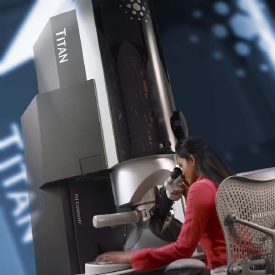Nov 4 2008
FEI Company , a leading provider of high-resolution imaging and analysis systems, announced today that three of the top life sciences research centers in Asia—National University of Singapore, Tsinghua University (Beijing), and the Institute of Biophysics at the Chinese Academy of Sciences (Beijing)―have selected the Titan Krios™ transmission electron microscope (TEM) to support their research programs in structural molecular biology.
Based on FEI’s renowned Titan™ TEM platform, the Titan Krios combines the power of the Titan electron optics, with a sophisticated cryogenic sample stage and sample handling robotics for a completely automated, high-throughput life sciences TEM solution. FEI’s Titan Krios enables researchers to create three-dimensional molecular-level images of biological material in its native hydrated state.
“Modern cryo-electron microscopes, such as the Titan Krios, are optimized for visualizing the molecular structures and interactions that we need to observe,” said Professor Wanzhong He of the National University of Singapore (NUS). “For instance, with cryo-electron tomography, we can look at intact cellular systems arrested at an instant in time. Not only can we see macromolecular structures down to a resolution of a couple of nanometers, we see them in the context of the neighboring structures and molecular entities with which they naturally interact. And, because we are capturing snapshots of individual molecular instances, we will be able to analyze the dynamic behavior of flexible proteins and follow the conformational changes that are at the heart of many biological structure-function relationships.” In addition to developing electron tomography (ET) as a technique, Prof. He’s research interests include using ET to trace endocytic trafficking events and to dissect the molecular mechanisms of genetic and infectious diseases. The Titan Krios will be located in the state-of-the-art NUS Cryo-EM facility, led by Prof. He. The new facility will be completed by summer 2009 and will be a key resource in the NUS Centre for BioImaging Sciences.
At Tsinghua University, Dr. Yigong Shi, vice director of the Institute of Biomedicine, will use the Titan Krios in research aimed at understanding the molecular mechanisms of tumorogenesis. At the Chinese Academy of Sciences, Professor Tao Xu’s research focuses on elucidating the molecular and cellular mechanisms underlying blood glucose regulation.
“The Titan Krios is a powerful platform for investigating cellular and molecular ultra-structure of proteins, viruses and liposomes,” said Matthew Harris, vice president and general manager of FEI’s Life Science Division. “It is specifically designed for the unique requirements of high-resolution and high-throughput life science imaging. The impressive capabilities of the Titan Krios open the gates to the investigational frontier of biological sciences, presenting opportunities for ground-breaking results and breakthrough discoveries.”
The Titan TEM platform delivers the fundamental mechanical, electronic and thermal stability required for ultimate performance in both life science and materials science applications. The Titan Krios, specifically designed for biological applications, is optimized for cryo-transmission electron microscopy, dual-axis cryo-electron tomography, and automated single particle analysis.
FEI Company , a leading provider of high-resolution imaging and analysis systems, announced today that three of the top life sciences research centers in Asia—National University of Singapore, Tsinghua University (Beijing), and the Institute of Biophysics at the Chinese Academy of Sciences (Beijing)―have selected the Titan Krios™ transmission electron microscope (TEM) to support their research programs in structural molecular biology.

Based on FEI’s renowned Titan™ TEM platform, the Titan Krios combines the power of the Titan electron optics, with a sophisticated cryogenic sample stage and sample handling robotics for a completely automated, high-throughput life sciences TEM solution. FEI’s Titan Krios enables researchers to create three-dimensional molecular-level images of biological material in its native hydrated state.
“Modern cryo-electron microscopes, such as the Titan Krios, are optimized for visualizing the molecular structures and interactions that we need to observe,” said Professor Wanzhong He of the National University of Singapore (NUS). “For instance, with cryo-electron tomography, we can look at intact cellular systems arrested at an instant in time. Not only can we see macromolecular structures down to a resolution of a couple of nanometers, we see them in the context of the neighboring structures and molecular entities with which they naturally interact. And, because we are capturing snapshots of individual molecular instances, we will be able to analyze the dynamic behavior of flexible proteins and follow the conformational changes that are at the heart of many biological structure-function relationships.” In addition to developing electron tomography (ET) as a technique, Prof. He’s research interests include using ET to trace endocytic trafficking events and to dissect the molecular mechanisms of genetic and infectious diseases. The Titan Krios will be located in the state-of-the-art NUS Cryo-EM facility, led by Prof. He. The new facility will be completed by summer 2009 and will be a key resource in the NUS Centre for BioImaging Sciences.
At Tsinghua University, Dr. Yigong Shi, vice director of the Institute of Biomedicine, will use the Titan Krios in research aimed at understanding the molecular mechanisms of tumorogenesis. At the Chinese Academy of Sciences, Professor Tao Xu’s research focuses on elucidating the molecular and cellular mechanisms underlying blood glucose regulation.
“The Titan Krios is a powerful platform for investigating cellular and molecular ultra-structure of proteins, viruses and liposomes,” said Matthew Harris, vice president and general manager of FEI’s Life Science Division. “It is specifically designed for the unique requirements of high-resolution and high-throughput life science imaging. The impressive capabilities of the Titan Krios open the gates to the investigational frontier of biological sciences, presenting opportunities for ground-breaking results and breakthrough discoveries.”
The Titan TEM platform delivers the fundamental mechanical, electronic and thermal stability required for ultimate performance in both life science and materials science applications. The Titan Krios, specifically designed for biological applications, is optimized for cryo-transmission electron microscopy, dual-axis cryo-electron tomography, and automated single particle analysis.